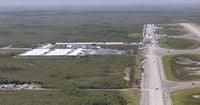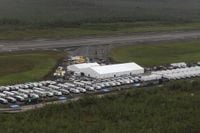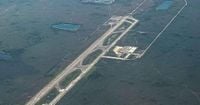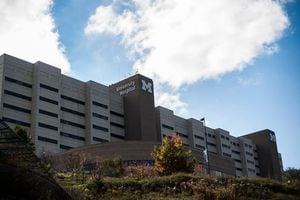Florida Governor Ron DeSantis announced on July 25, 2025, that deportation flights have officially begun from the state-run immigration detention center in the Everglades, known colloquially as "Alligator Alcatraz." This remote facility, situated roughly 50 miles west of Miami in the Big Cypress National Preserve near Everglades National Park, has become a focal point of Florida’s aggressive immigration enforcement efforts, aligning closely with the Trump administration’s crackdown on illegal immigration.
DeSantis revealed that the Department of Homeland Security (DHS) has operated the initial flights, transferring about 100 detainees directly from the center to other countries. While the specific destinations of these flights have not been disclosed, officials confirmed that two or three removal flights have already departed, with more expected to follow as the deportation cadence intensifies.
“I think you’re going to see the numbers go up dramatically,” DeSantis said during a news conference held near the facility. “The reality is this provides an ability to enhance the mission, to increase the number and frequency of deportations. And so what’s been done here has really been remarkable.”
The facility itself was constructed in an astonishingly short timeframe—built over eight days in June 2025—on the site of the former Dade-Collier Training and Transition Airport in Ochopee, Florida. The site spans approximately 10 square miles (26 square kilometers) and currently holds about 2,000 detainees, with plans to potentially double capacity to 4,000 individuals, according to Florida Emergency Management Director Kevin Guthrie.
Alligator Alcatraz is equipped with over 200 security cameras, more than five miles of barbed wire fencing, and staffed by around 400 security personnel. The adjacent runway, which has runway lighting and stores approximately 5,000 gallons (18,927 liters) of jet fuel, allows for efficient transfer of detainees directly onto deportation flights without the need for long ground transport to other airports. “You don’t have to drive them an hour to an airport. You go a couple thousand feet, and they can be on a plane and out of here,” DeSantis explained.
The Florida governor framed the facility and its operations as a model for other states, emphasizing the state's partnership with DHS and Immigration and Customs Enforcement (ICE). Garrett Ripa, Miami field director for ICE, confirmed the removal flights, stating the individuals flown out were “illegally present in the state of Florida.”
Florida’s efforts extend beyond the detention center. Larry Keefe, head of Florida’s Board of Immigration Enforcement, noted that the state has significantly expanded its immigration enforcement capacity. In the days leading up to the announcement, the Trump administration issued credentials to over 1,200 Florida sheriff’s deputies and more than 650 state agents, effectively doubling the manpower available for immigration-related arrests. Keefe warned of a “surge” in immigration arrests statewide, with 1,800 Florida troopers already deputized as federal immigration agents under Section 287(g) agreements, which allow state and local law enforcement to perform certain federal immigration functions.
DeSantis also revealed plans to have immigration judges stationed on-site at Alligator Alcatraz to expedite deportation proceedings, pending approval from the U.S. Justice Department. “This was never intended to be something where people are just held,” he said. “The whole purpose is to be a place that can facilitate increased frequency and numbers of deportations.” However, DeSantis questioned whether undocumented immigrants should be afforded the same due process rights as U.S. citizens, suggesting the immigration process “should be a pretty simple process. You either have a right to be here or you don’t.”
The detention center’s conditions have been a subject of intense controversy. Multiple detainees and advocacy groups have reported harsh and unsanitary conditions, including rotting food, infrequent access to showers, malfunctioning toilets, floodwaters, and mosquito infestations. The American Civil Liberties Union (ACLU) filed a lawsuit in July 2025, joined by immigrant advocates and detainees, alleging violations of due process and restricted access to legal counsel. The detainees demand better access to attorneys, a right that the ACLU argues is constitutionally protected.
In response, Kevin Guthrie defended the facility’s medical and living conditions, stating that the detention center has a fully staffed medical team, including doctors, nurse practitioners, registered nurses, and paramedics on duty at all times. Guthrie also dismissed claims of inadequate medical treatment and poor sanitation as “absolute crap.” He said on-site lawyer visits were delayed due to technological issues but expected to begin shortly after the announcement.
Environmental concerns have also been raised about the facility’s location in the sensitive Everglades wetlands. Environmental groups and Indigenous members of the Seminole and Miccosukee tribes have criticized the decision to build the detention center in this protected area, citing potential ecological harm and disruption. Lawsuits have been filed to halt further construction and expansion. Guthrie countered these concerns by noting the site’s history as a training airport with over a hundred flights per day, although this claim has not been independently verified.
Miami-Dade County officials have expressed frustration over the lack of transparency and communication from state authorities regarding the facility. County Mayor Daniella Levine Cava sent a letter demanding briefings and oversight access, emphasizing that the detention center operates on county-owned property. DeSantis and his administration have maintained tight control over access, denying press entry during the July 25 press conference, a decision defended by DeSantis who cited prior tours during President Trump’s visit on July 1, 2025.
The facility’s name, “Alligator Alcatraz,” was chosen deliberately as a deterrent, referencing the notorious federal prison on San Francisco Bay. DeSantis and other Republican officials have embraced the facility’s remote location, surrounded by the Everglades’ wildlife, including pythons and alligators, as symbolic of the harsh consequences for breaking U.S. immigration laws. President Trump himself visited the site earlier in July, praising its rapid construction and security measures.
Florida’s aggressive approach to immigration enforcement includes a pilot program encouraging unauthorized immigrants to self-deport. Larry Keefe reported that about two dozen detainees had chosen to leave voluntarily under this initiative, which is distinct from a federal program offering financial incentives for self-deportation.
Financially, the detention center represents a substantial investment. Florida estimates the annual operating cost at approximately $450 million, with some reimbursement expected from the Federal Emergency Management Agency (FEMA). Critics, including some Republicans, argue that the cost per detainee is significantly higher than in state prisons or federal ICE detention centers. The DeSantis administration has removed detailed contract information from public procurement websites, citing proprietary concerns, drawing criticism from lawmakers seeking transparency.
Despite legal challenges, environmental lawsuits, and public criticism, Florida continues to position itself at the forefront of immigration enforcement, with Alligator Alcatraz as a centerpiece of this strategy. DeSantis, who briefly ran for president in 2023, has sought to showcase Florida as a blueprint for conservative governance and tough immigration policies.
As deportation flights increase and enforcement efforts intensify, the fate of thousands detained in the Everglades facility remains a contentious issue, drawing national attention to the balance between immigration control, human rights, and environmental stewardship.






